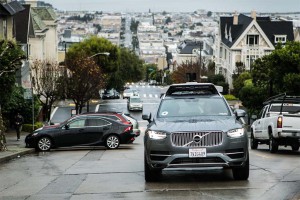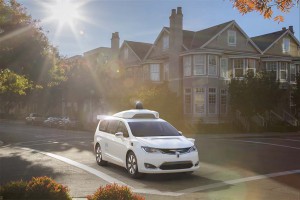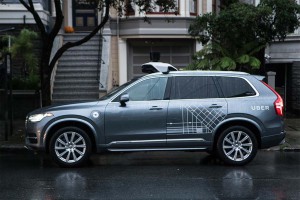
An autonomous Volvo XC90 used by Uber in San Francisco. The original test was cut short when Uber refused to get a state permit.
Uber will purchase as many as 24,000 XC90 sport-utility vehicles from Volvo as part of its push to become an autonomous and, eventually, a fully driverless ride-sharing service.
The Swedish automaker previously provided a small number of XC90 s for autonomous pilot programs Uber operated in several cities, including San Francisco and Phoenix. The non-exclusive and non-binding deal would take things a giant step forward and allow Uber to launch autonomous operations on a commercial level starting in 2019.
“This new agreement puts us on a path towards mass produced self-driving vehicles at scale,” said Jeff Miller, Uber’s head of auto alliances, adding that he was “thrilled” to expand the ride-sharing service’s alliance with Chinese-owned Volvo.
(Is Uber finally on the mend after months of trouble? Click Here for the latest.)
Uber and competitors like Lyft ultimately hope to take the driver out of their vehicles since that is the single largest component in cost of a ride. Uber founder Travis Kalanick – who was ousted earlier this year – had estimated that by using fully driverless vehicles the cost of using the service would drop below what it costs to own and operate a private vehicle.
A study release this month by the Boston Consulting Group estimated that by 2030 as much as 25% of the miles Americans clock on the road each year will be in driverless vehicles operated by ride-sharing services. The primary center of operation would be in dense urban areas, with the financial advantage falling off in less densely populated areas.
Volvo has an aggressive program working on the development of autonomous and even more advanced driverless vehicles and is already running its own tests, including one program near its headquarters in Gothenburg, Sweden. But it appears that Uber will equip the XC90s Volvo plans to provide with its own software.
Volvo and Uber aren’t revealing what the planned purchase – set to run between 2019 and 2021 – will cost but they announced a $300 million alliance last year.
The ride-sharing service operates a research center out of Pittsburgh. But Uber has run into a potential roadblock. It is in the midst of a long-running legal battle with Waymo, the autonomous spin-off of Google. Waymo claims a former employee stole some of its intellectual property before going to work for Uber. The San Francisco-based ride-sharing company has denied that allegation though it also dismissed its former autonomous development chief, Corey Lewandowski.
Virtually every major automaker is now working on some form of autonomous program, as are numerous automotive suppliers and new entries into the automotive world. So is Uber’s chief rival, Lyft. That company has negotiated deals with several manufacturers, including General Motors and, more recently, Ford Motor Co., that will put some of their autonomous vehicles into fleet testing and eventual commercial application. Lyft is also working with Waymo and self-driving tech firms nuTonomy — recently purchased by Delphi — and Drive.AI.

Waymo launched a pilot ride-sharing program in Phoenix using autonomous Chrysler minivans. It will be adding more fully driverless vans.
Waymo is running its own self-driving pilot program in Phoenix using Chrysler Pacifica Hybrids, and it recently announced plans to buy hundreds more as it begins real-world testing of fully driverless minivans as part of the ride-sharing service.
(For more on that Waymo pilot program, Click Here.)
“The automotive industry is being disrupted by technology and Volvo Cars chooses to be an active part of that disruption,” said Volvo Cars CEO Hakan Samuelsson. Calling the latest announcement “a big commercial deal,” he said that the Swedish carmaker will now get a helping hand to move forward with its own autonomous and driverless technologies.

